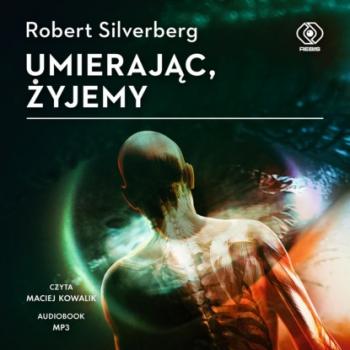Robert Silverberg
Список книг автора Robert SilverbergNightwings
"Nightwings" is a science fiction novella by American wrier Robert Silverberg. It won the Hugo Award for Best Novella in 1969 and was also nominated for the Nebula Award in 1968. It won the Prix Apollo Award in 1976.<P> In a decadent and caste-based future, humanity is divided into guilds, each having a specific job to do. The members of some guilds appear to have undergone genetic engineering, for instance, the Fliers' ability to fly and the Watchers' ability to use their mental capabilities to watch distant stars. <P>The main character in the novella is a Watcher whose mission is to watch the skies with some sophisticated equipment and to inform the Defenders in the event of an alien invasion. Along with a young Flier girl and a Changeling (who belongs to no guild), he visits the old city of Roum (suspected previously to be called Rome), and becomes entangled in events including the possibility of invasion.
Death Do Us Part
This modern classic of science fiction—first published in 1996—has been reprinted more than 15 more times since its original appearance, including in a Year's Best volume.<P> * * * *<P> It was her first, his seventh. She was 32, he was 363: the good old April/September number. They honeymooned in Venice, Nairobi, the Malaysia Pleasure Dome, and one of the posh L-5 resorts, a shimmering glassy sphere with round-the-clock sunlight and waterfalls that tumbled like cascades of diamonds, and then they came home to his lovely sky-house suspended on tremulous guy-wires a thousand meters above the Pacific to begin the everyday part of their life together.<P> Her friends couldn’t get over it. “He’s ten times your age!” they would exclaim. “How could you possibly want anybody that old?”
Passengers
For three years, people on Earth have been subject to the will of the «Passengers»—intangible beings who usurp human bodies temporarily and without warning, and do nothing but play and cause havoc. People being «ridden» are ignored by others, and when they are freed, the experience, by social convention, is ignored by all. When the Passenger leaves the host body, the person is left with no memories of his time being ridden.<P>"Passengers" was nominated for the Hugo Award for Best Short Story 1970, and won the Nebula Award for Best Short Story in 1969.
Gilgamesh in the Outback
"Gilgamesh in the Outback" is a science fiction novella by American writer Robert Silverberg, a sequel to his novel Gilgamesh the King[ as well as a story in the shared universe series «Heroes in Hell.» It won the Hugo Award for Best Novella in 1987 and was also nominated for the Nebula Award for Best Novella in 1986. Real-life writers Robert E. Howard and H. P. Lovecraft feature as characters in the novella.
Born with the Dead
"Born with the Dead" is a science fiction novella by Robert Silverberg. It describes a near-future world in which the recently dead can be «rekindled» to a new life, but one in which their personalities and attitudes are radically changed; although they possess their memories from their previous lives, their former concerns no longer appear important to them. The story parallels that of Eurydice and Orpheus in the underworld.
The Robert Silverberg Science Fiction MEGAPACK®
Robert Silverberg needs little introduction to anyone at all familiar with the history of the science fiction field. Fan. Author. Editor. Creative force. He has been an integral part of the field for longer than most of his readers have been alive. Earlier this year, he kindly agreed to put together a MEGAPACK® of his short stories, so here, then, is a selection of early works by one of the all-time greats. Included are:<BR> ALAREE<BR> BIRDS OF A FEATHER<BR> BLAZE OF GLORY<BR> DELIVERY GUARANTEED<BR> THE DESSICATOR<BR> THE HAPPY UNFORTUNATE<BR> THE HUNTED HEROES<BR> THE IRON STAR<BR> THE ISOLATIONISTS<BR> THE LONELY ONE<BR> THE MAN WHO CAME BACK<BR> NEUTRAL PLANET<BR> OZYMANDIAS<BR> THE PAIN PEDDLERS<BR> THE PLEASURE OF THEIR COMPANY<BR> POINT OF FOCUS<BR> POSTMARK GANYMEDE<BR> PRIME COMMANDMENT<BR> THE SONGS OF SUMMER<BR> SPACEROGUE<BR> THERE WAS AN OLD WOMAN<BR> THE WOMAN YOU WANTED<BR> VALLEY BEYOND TIME<BR> WE KNOW WHO WE ARE<BR> If you enjoy this ebook, don't forget to search your favorite ebook store for «Wildside Press Megapack» to see more of the 300+ volumes in this series, covering adventure, historical fiction, mysteries, westerns, ghost stories, science fiction – and much, much more!<P>[Version 1.5]
The Inquisitor
“The Inquisitor,” was written in May, 1956 for William Hamling's IMAGINATION magazine, as Robert Silverberg writes in his lengthly introduction, «a few weeks before my graduation from Columbia, and put my own byline on it, but when Hamling published it in the December, 1956 issue of IMAGINATION it was credited to Randall Garrett, and so it has remained in bibliographies to this day. It’s my work, though: a compact synthesis, in 2500 words, of the themes of Arthur Koestler’s Darkness at Noon and Franz Kafka’s “In the Penal Colony,” two classic works of fiction that would have been very much on my mind as I rounded out my days as a literature major at Columbia.»
The Ultimate Weapon
In his Introduction, Robert Silverberg writes: «I started [this story] in classic pulp mode, opening with my protagonist’s name, showing that he was in big trouble, and providing a setting: “Laird Hammill raced frantically through the cold night of Denerix, largest world of the Shanador system. He was somewhere on a dark, vast plain outside the city of Lombrosa, and a half mile behind him lay the useless hulk of his burned-out landcar.” The story continues that way, slam and bang and biff and pow, displaying my precocious command of pulp formulas right to the curtain line ('We’ve won, darling....') It moves along very nicely, I think. And in its portrayal of a race of intelligent beings that dwell in the hearts of stars I touch on a theme that I would return to, decades later, in my novel Starborne.»









